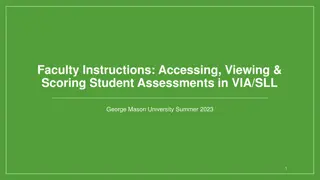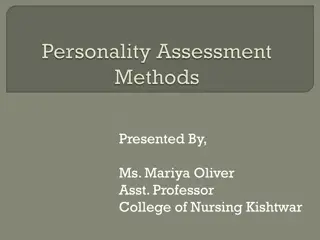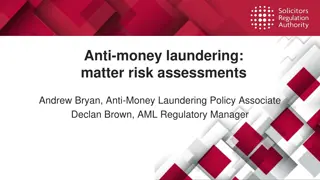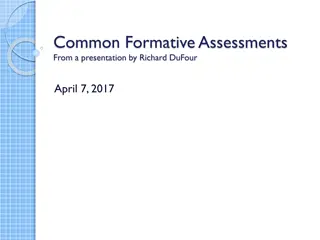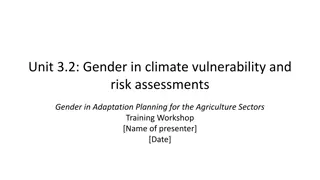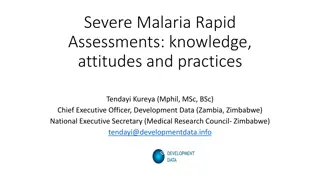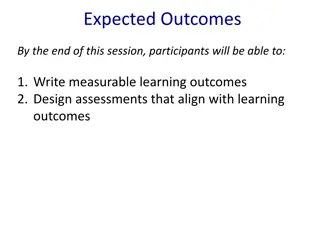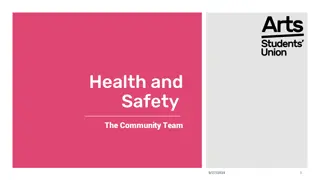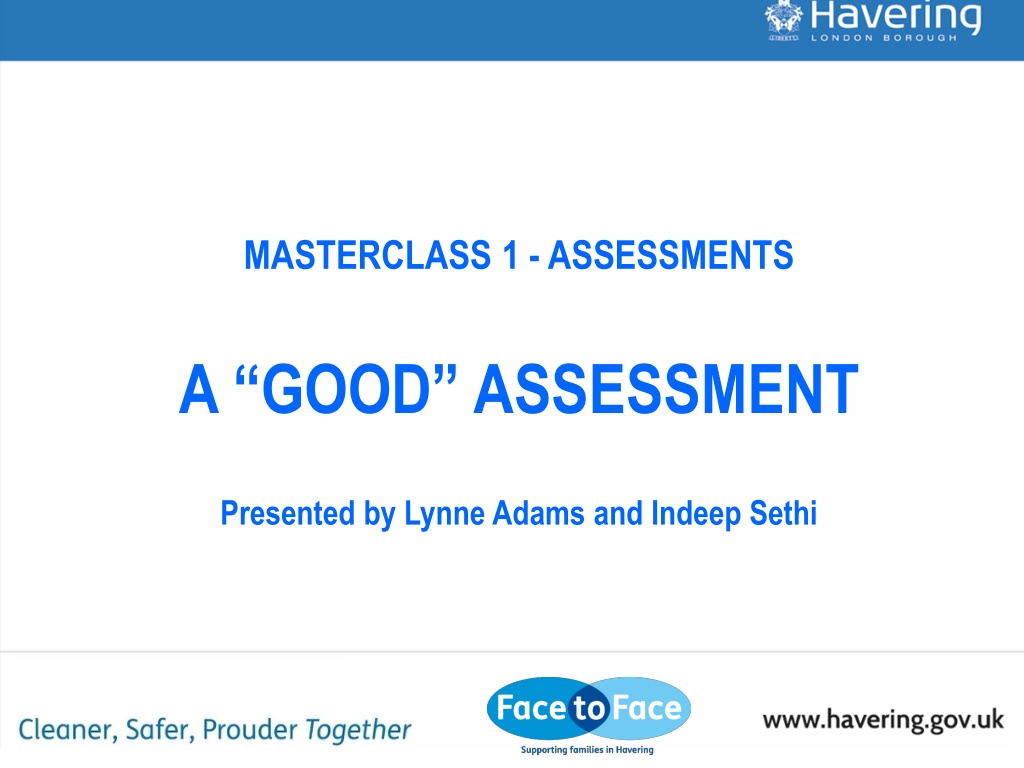
Effective Child Assessment Strategies for Family Support
Explore the key components of a good assessment focusing on child welfare and family dynamics. Understand how to identify risks, engage with families, and provide holistic support tailored to individual needs. Dive into a case study highlighting neglect, substance misuse, domestic violence, and learning difficulties within a young family unit.
Uploaded on | 0 Views
Download Presentation

Please find below an Image/Link to download the presentation.
The content on the website is provided AS IS for your information and personal use only. It may not be sold, licensed, or shared on other websites without obtaining consent from the author. If you encounter any issues during the download, it is possible that the publisher has removed the file from their server.
You are allowed to download the files provided on this website for personal or commercial use, subject to the condition that they are used lawfully. All files are the property of their respective owners.
The content on the website is provided AS IS for your information and personal use only. It may not be sold, licensed, or shared on other websites without obtaining consent from the author.
E N D
Presentation Transcript
MASTERCLASS 1 - ASSESSMENTS A GOOD ASSESSMENT Presented by Lynne Adams and Indeep Sethi
What Good Assessments Looks Like Have a clear purpose of intervention and are produced within clear timescales Identify strengths and risks and areas for improvement to develop and inform the plan Are dynamic, proportionate to risk and change in light of emerging issues and risks Are child focused and provide information on the child, their family and the impact of the harm Evidence engagement with children and their families capturing the voice of the child Explore the role of fathers or male partners Explore the family s history and functioning in context of their cultural and diversity needs Social GRRAACCESS Show curiosity about the family s current circumstances, and what support has been offered previously Consider the holistic needs of each child and their family; refer to the Common Assessment Framework to balance the Child s Needs against the Parent s Capacity to meet those needs and influence of Family & Environmental Factors Include contributions from key professionals known to the family Utilise and analyse evidence based assessment tools, e.g. Barnardo s Neglect Tool Kit, Safe Lives Dash Risk Assessment, Barnardo s Domestic Violence Risk Assessment, CCE Risk Assessment, CSE Risk Assessment etc Are clear, legible and understandable to parents and children (dependent on age and ability) Use research to support analysis, conclusion and recommendations. Have a well written and clear analysis, are child focused and identify outcomes to improve the child s lived experience
Case Study Two children aged 5 and 2 Dee (F) and Zack (M) Young Parents Denise (21) and Karl (23) Parents individual difficult life experiences Parental substance misuse Domestic violence Learning difficulties Neglect poor routines, school attendance, poor nutrition Housing issues
This case was audited and this assessment was rated as Good. Below is an extract from the assessment The main concerns are around the parent's understanding of what their children need and whether they are able to place their children's needs before their own, in order to prevent further neglect. The children have experienced neglect throughout their lives with concerns raised by a variety of professionals around the unhygienic and cluttered home conditions, supervision of the children, cleanliness of the children, lack of routines, poor nutrition, low school attendance and punctuality issues (arriving between 9:30am and 1:30pm), lack of consistent boundaries and inappropriate behaviour management (blaming Dee 5 for poor school attendance, repeated negative comments to Dee and unrealistic expectations). The parents each have their own personal difficulties that have not been addressed. Karl was in care as a child and has ADHD. He has a history of violence and substance misuse (alcohol and cannabis). Denise has learning needs (she says she has problems with reading and writing, if people use long words she may become lost, she says that she sometimes forgets things such as where she has put things and she feels she may have ADHD). Denise was sexually abused at 13 y and raped at 15y. It is possible that Dee was conceived as a result. Denise says she was not believed at the time, and she struggles with flashbacks. Denise has used cannabis whilst pregnant with Zack and denies using it now. However, she is often sleepy and unmotivated, at times there is a weed like odour in the flat, but Denise says this is the neighbours. The parents' relationship has been problematic with the police being called to the home on several occasions following arguments. Denise has stated that Karl has never hurt her but in the police documentation (dated 29/1/19), Denise responded to questions saying that Karl could be controlling and agreed that he had attempted to block her airways/strangle her in the past. The Family remain in overcrowded one-bedroom temporary accommodation- Parents have not returned relevant documents to housing, are not regularly bidding and gas is not being paid. The family are isolated in Havering as their support network is in Dagenham.
What things stand out about this written narrative? Do you agree that this a good well written account? Looking back at What Good Looks Like in conjunction with this extract, what questions arise for you?
What would make this assessment better? The main concerns are around the parent's understanding of what their children need and whether they are able to place their children's needs before their own in order to prevent further neglect. The children have experienced neglect throughout their lives with concerns raised by a variety of professionals around the unhygienic and cluttered home conditions, supervision of the children, cleanliness of the children, lack of routines, poor nutrition, low school attendance and punctuality issues (arriving between 9:30am and 1:30pm), lack of consistent boundaries and inappropriate behaviour management (blaming Dee 5 for poor school attendance, repeated negative comments to Dee and unrealistic expectations). What affect has this had on Dee and Zack presentation and development? What might it feel like for Dee to be the child in school who is always late for school? What impact does this have on her peer relationships and her learning? What do we know about the impact of poor nutrition, routines and boundaries for children? The parents each have their own personal difficulties that have not been addressed. Karl was in care as a child and has ADHD. He has a history of violence and substance misuse (alcohol and cannabis). Denise has learning needs (she says she has problems with reading and writing, if people use long words she may become lost, she says that she sometimes forgets things such as where she has put things and she feels she may have ADHD). Denise has used cannabis whilst pregnant with Zack and denies using it now. However, she is often sleepy and unmotivated, at times there is a weed like odour in the flat but Denise says this is the neighbours. What do we hypothesise about the parents lived experiences vs the lived experience for their children? What impact does the parents sleepy and unmotivated nature have on the quality of the care for the children? What impact does being under the influence of cannabis have on their parenting?
Denise was sexually abused at 13yo and raped at 15yo. It is possible that Dee was conceived as a result. Denise says she was not believed at the time, and she struggles with flashbacks. How might this impact on the relationship between Denise and Dee? What does Dee understand about who her father is? The parents' relationship has been problematic with the police being called to the home on several occasions following arguments. Denise has stated that Karl has never hurt her but in the police documentation (dated 29/1/19), Denise responded to questions saying that Karl could be controlling and agreed that he had attempted to block her airways/strangle her in the past. How do the children experience their parents relationship? What impact does exposure of DV have on the emotional welfare of these children? The Family remain in overcrowded one-bedroom temporary accommodation - Parents have not returned relevant documents to housing, are not regularly bidding and gas is not being paid. The family are isolated in Havering as their support network is in Dagenham. How does this affect the children s quality of life? What does it feel like for the parents? There is no privacy? What could the children be exposed to because of the lack of personal space?
Presenting the Narrative from the childs perspective Looking back at these questions: What affect has this had on Dee and Zack presentation and development? What must it feel like for Dee to be the child in school who is always late for school? What impact does this have on her peer relationships and her learning? What do we know about the impact of poor nutrition, routines and boundaries for children?
Presenting the Narrative from the childs perspective Dee s lack of routine and poor school attendance is impacting on her attainment in school. She is behind her peers in respect of her learning. This in turn has impacted on her peer relationships. Her lateness and absences have affected Dee in settling into play and activities with other children in her class. Although Dee is only in the early years of her educational development and experience, if the situation does not improve she is likely to continue falling further behind, and risks being alienated from her peers. The lack of routine especially around sleeping and meal times is likely to be affecting Dee s energy levels through the day. Her ability to concentrate is likely to be affected if she is feeling tired. Her poor nutrition is also likely to have a longer term effect on her physical and cognitive development. Dee s lack of routine and consistent care or boundaries places her at greater risk of developing maladaptive behaviours to compensate for the lack of adult guidance and support. The lack of consistency in particular can create anxiety and worry for young children who are reliant on their primary carers to anticipate and meet their basic needs. When those basic needs are frequently neglected, some children lose trust in adults; this can impact on their ability to trust and rely on any one to understand or meet their needs in the future. Dee is observed to be a self-sufficient little girl. Although she is only 5yo, she was observed to climb onto a chair to obtain her own bowl, spoon, milk and cereal and pour her own breakfast, and ensure that her brother was also provided with food; although on this occasion she utilised the support of the FSW in the home, it was evident during this observation that she has done this task many times before and the question is raised about what other lengths she would probably go to in order to feed herself when adults are not fulfilling this need (and other needs) for her. Her care and attention for her younger brother is also a sign of her undertaking tasks that are far beyond what would ordinarily be expected for a child of her age.
Presenting the Narrative from the childs perspective Dee herself also shared in direct work that sometimes she resorts to literally screaming in order to get the attention of her parents. This must be a very distressing feeling for Dee. How frustrated must she feel to get to the stage that her only option is to scream? How many times was she driven to screaming before she realised that this was her best way to be noticed. How do her parents react to her when she screams? Does she fear repercussions from acting out in this way? Zack is younger than Dee, and thus far has had less time exposure to the inadequate care he is offered by his parents. However, if there is no sustained change from his parents in providing consistent basic care to ensure his physical, emotional and developmental needs are appropriately met, it is likely that Zack will experience the same difficulties as described for Dee. Zack is also of an age where he is very impressionable. He has been observed to share a close relationship with his older sister. She is attentive to his needs, which is likely to offer him some comfort and reassurance when he is feeling ignored by his parents. However there are other behaviours that he is being exposed to which are a cause for concern. Many children, who are younger siblings, have a tendency to mimic the behaviours of older siblings; they are often a very important role model. Dee is exhibiting behaviours which not only place herself at risk, but if mimicked by Zack, place Zack at risk too. Also some of these early maladaptive behaviours already observed with Dee, i.e. screaming for attention, can be easily adopted by Zack as a means to get his needs met too. There is a risk that their competing needs could cause conflict in their relationship (over and above the usual sibling rivalry that can exist). Indeed there are observations of Zack hitting Dee with a high heeled shoe; neither parent reacted or intervened. What messages does this give a child of Zack s age, but also what messages does this continue to enforce for Dee?
What difference do you see in what you have read? What difference has this made to the quality of the assessment? LA
Task Using the new narrative, identify the outcomes that need to be achieved to improve the lived experience for these children. Your outcome focused plan is required for your attendance at the 'Plans' Masterclass. LA



